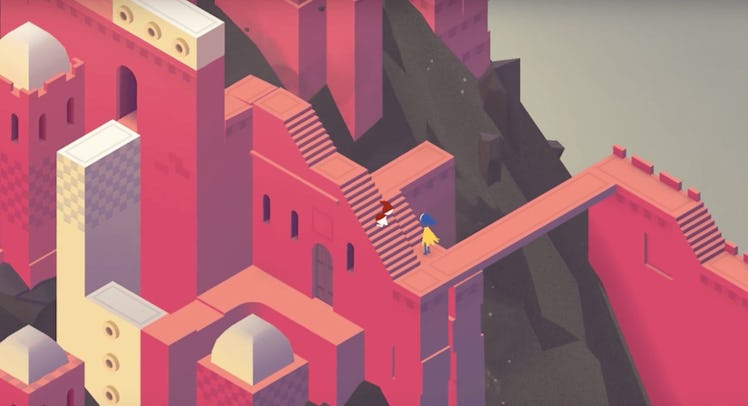‘Monument Valley 2’ Tells a Story of the Pain of Letting Your Kid Go
'Monument Valley 2' evolves the popular game by making it a story about parenting.

Three years ago, Monumental Valley burst on to the iPhone gaming scene with its endless mazes, mind-blowing optical illusions, and subtle, but resonant storytelling. It was a cultural phenomenon, winning Apple’s best iPad game of 2014, selling more than 50 million copies, and even becoming the favorite game of House of Cards‘ Frank Underwood. Now, the long-awaited sequel has finally dropped and promises a whole new world of shape-shifting castles and M.C. Escherian mazes to be explored. While complete fantasy, the game may strike parents as surprisingly familiar. Because while Monumental Valley 2 follows the same vague, dream-like structure of its predecessor, it’s secretly a game all about what it’s like to be a parent.
The protagonist of Monument Valley 2 is Ro. In most ways, she’s similar to Ida, the path-wandering protagonist from the original. There is, however, one crucial difference: Ro has a daughter. Ro’s daughter is not given a name or much in terms of personality, but players will subtly notice her growth as the game progresses. At the start, Ro’s every step is imitated by her daughter, but as time goes on, they must separate to complete the game.
This not-so-subtle metaphor for parenting was completely intentional: Game designers purposely made the major theme of Monument Valley 2 parenthood, as many of them borrowed from their own experience raising children. There’s even a level that’s meant to represent parental leave, which is captured perfectly in a dark, mysterious level where Ro and her daughter are separated for the first time.
Even without the parental theme, Monument Valley 2 is a must-have game. It expands on the original’s ingenious architectural puzzles and haunting sense of place to create a worthy successor. The beautiful way it’ll remind you of the immense joy and pain that comes with choosing to raise a child is merely a bonus.
This article was originally published on